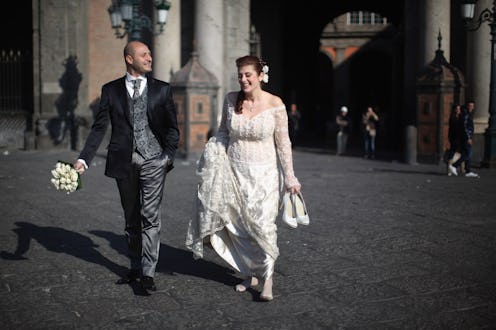Life
More Young Women Keep Their Maiden Names: But Why?
There are a lot of old marriage customs we don’t follow anymore. The bride is no longer carried across the threshold of the groom's home or exchanged for a flock of sheep. Could the practice of a woman adopting her husband's name go the way of giving dowries?
A survey published in last week’s Sunday Times found that young women are more likely than older generations to hold on to their maiden names, though the name-retainers remain in the minority: 33 percent of married women in their 20s have kept their maiden name, compared to 20 percent of women in their 30s and just nine percent of women in their 60s. The study, carried out by Facebook and commissioned by the Times, analyzed the profiles of women whose status was “married” and whose husbands also had Facebook.
But does this mean that a new generation of women is consciously embracing feminism (as The Telegraph assumes)— or is the trend in favor of name-retention just a practical offshoot of women’s marrying later? As the average age of first marriage rises, so does the chance that a woman has established a professional identity under her maiden name. (The mean age of a first-time bride today is 27, compared to 23 in 1990 and just 20 in 1960.) And in an age where women (and men) are increasingly cynical about the prospect of divorce (which claims more than 50 percent of first marriages), and a third of single adults say they would ask their spouse to sign a prenup, women might be wary of the awkward possibility of having to change their name again.
Nonetheless, women are subject to judgment and social pressures either way. A 2010 Dutch study found that a woman who took her husband’s name would be “judged as more caring, more dependent, less intelligent, more emotional, less competent, and less ambitious in comparison with a woman who kept her own name.”
But sometimes name choice is aesthetic, not ideological. For many single millennial women, the most important factor in whether they would take their husband's name isn’t a desire to identify with the women’s movement or assert an independent identity — it’s whether they like the sound of their future husband’s last name.
“If it’s a bad name, I definitely wouldn’t take it,” says Alida Davis, 20.
“It will really depend on the man’s name,” Anne Flanagan, who is in her early 30s, agrees. “Professionally, it would probably be necessary to hold on to my own name, so double-barrel is a good compromise…. But if I were to go down the double-barreled route, it could not be ridiculous, so we have to wait and see what the name is.”
Take heed, though, men: not all women are so flexible. “I’d prefer not to change my name,” says Gina Ford, 21. “Having a guy insist would put me off him.”
What about guys in their 20s? Do they expect their wives to take their names?
Robin Anderson, 22, doesn't. “It smacks too much of property possession, like putting my name on my favorite mug,” he says.
Fortunately, there are as many options as there are opinions. Keep your name professionally, change it personally, hyphenate it secretly. Make up a new one. Call yourself Mrs., call yourself Ms., call yourself Madame. Isn’t choice what feminism is all about?
